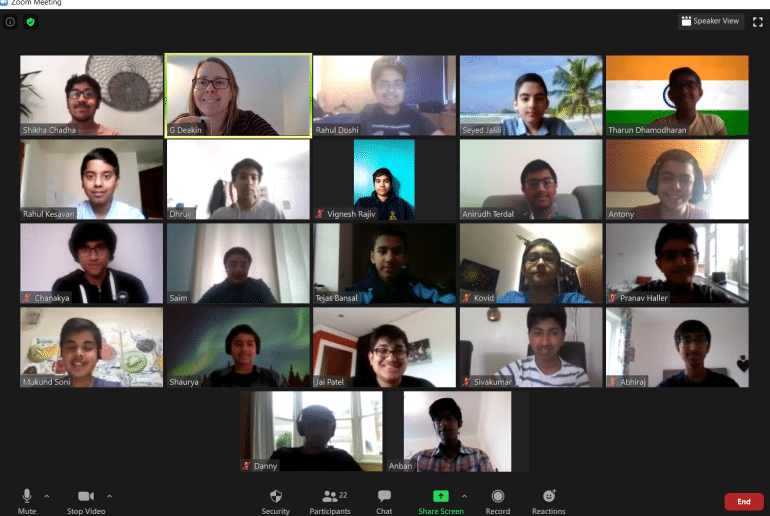
While Covid-19 has raged around the world this term, members of QE’s Model United Nations Club have been examining the very different approaches to the pandemic taken around the globe.
The 24 boys involved were each allocated a country, from Australia to Iceland and from the USA to North Korea. Each member, from Years 8 to 10, was given a brief to research his nation’s response to the crisis and look at the treatment for the virus and the global distribution of a vaccine in the future.
They met regularly using Zoom to discuss the huge issues and challenges facing the global community.
Academic Enrichment Tutor Gillian Deakin said: “It has been great to see the boys adopting their different countries and examining their responses to Covid–19. Every week they have contributed fascinating insights into how different countries have responded.
“With countries as diverse as Japan, Iran, France, Kenya and the USA, the participants have had to get to grips with their often very different respective policies and perspectives.”
The club is an academic simulation of the United Nations itself, where pupils take the roles of delegates from different countries and investigate possible solutions to global issues.
The boys have also been learning how to write policy statements and resolutions in preparation for an MUN event at Magdalen College School, Oxford, in February next year.
“They have gained real insight and understanding of the function of the different organisations within the UN in addition to an appreciation of the possibilities and challenges of the global development and distribution of a treatment or vaccination for Covid–19,” added Miss Deakin.
“The boys are all looking forward to returning to the School and preparing for next year’s mini–MUN conference.”
The participants are listed below, each with his allocated country:
Danny Adey (Year 10) – Japan; Eesa Ahmed (Year 9) – Saudi Arabia; Tejas Bansal (Year 8) – Germany; Dhruv Chadha (Year 9) – South Korea; Karan Chauhan (Year 8) China; Tharun Dhamodharan (Year 9) – India; Rahul Doshi (Year 10) – Russia; Kovid Gothi (Year 8) – France; Pranav Haller (Year 8) – USA; Seyed Jalili (Year 8) – Iran; Shaurya Madan (Year 8) – New Zealand; Dhruv Syam (Year 10) – Sweden; Rahul Kesavan (Year 10) – Sri Lanka; Saim Khan (Year 8) – Pakistan; Zaki Mustafa (Year 8) – UK; Jai Patel (Year 10) – South Africa; Vignesh Rajiv (Year 9) – Switzerland; Chanakya Seetharam (Year 8) Canada; Anban Senthilprabu (Year 9) – North Korea; Abhiraj Singh (Year 10) – Iceland; Sai Sivakumar (Year 9) – Australia; Mukund Soni (Year 10) – Italy, Anirudh Terdal (Year 8) – Kenya; Antony Yassa (Year 10) – Egypt.

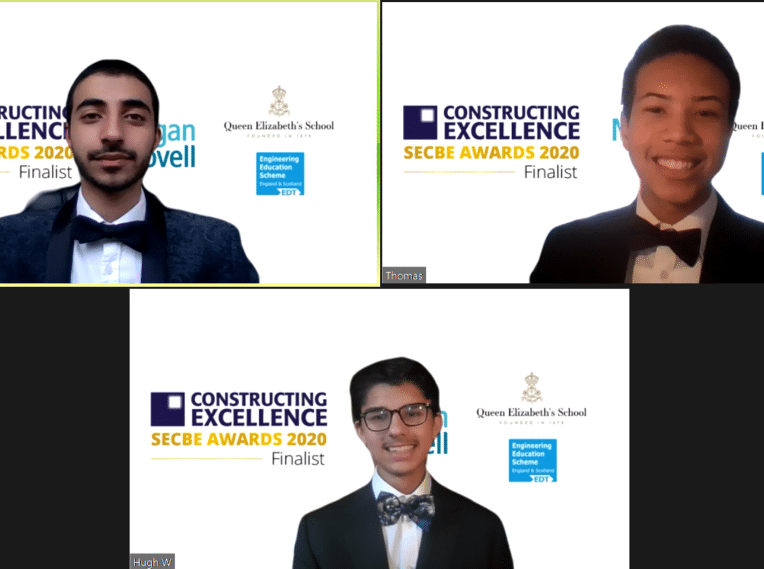
 Competing against entries from leading professional construction firms, QE’s four-strong Engineering Education Scheme team were rewarded by the judges for the strength of their design project aimed at reducing the risk of injury from band saws.
Competing against entries from leading professional construction firms, QE’s four-strong Engineering Education Scheme team were rewarded by the judges for the strength of their design project aimed at reducing the risk of injury from band saws.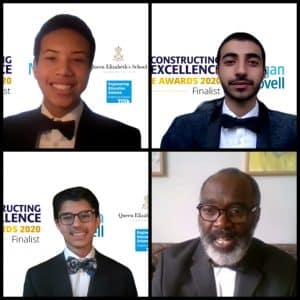 The team worked with office design specialists Morgan Lovell on the project, which involved a number of suggested improvements to band saw guards and dust extraction systems. Tweeting their “huge congratulations” to the QE four, Morgan Lovell said: “We’re really proud to be alongside the engineering minds of the future”.
The team worked with office design specialists Morgan Lovell on the project, which involved a number of suggested improvements to band saw guards and dust extraction systems. Tweeting their “huge congratulations” to the QE four, Morgan Lovell said: “We’re really proud to be alongside the engineering minds of the future”. An additional benefit of the designs was that they incorporated significant improvements to the existing dust extraction systems of saws, thus reducing dust exposure – another health & safety concern – and allowing a more precise cut to be made because of the enhanced visibility of the cutting service.
An additional benefit of the designs was that they incorporated significant improvements to the existing dust extraction systems of saws, thus reducing dust exposure – another health & safety concern – and allowing a more precise cut to be made because of the enhanced visibility of the cutting service.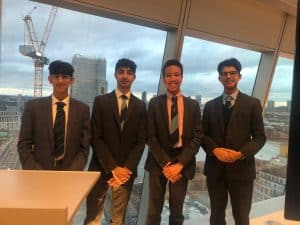 Team leader Thomas opened the team’s presentation to the judges at the virtual awards ceremony, before Hugh and Kai went through it in more detail. They faced some tough questioning from the judging panel, which comprised Chris Blythe (Chairman of SECBE, a construction industry not-for-profit company working towards positive change in the sector), Bill Ferris OBE (Chief Executive of Chatham Historic Dockyard Trust), James Wright (Framework Manager for Southern Construction Framework) and Julie Barry (Head of Business Development for RIFT R&D).
Team leader Thomas opened the team’s presentation to the judges at the virtual awards ceremony, before Hugh and Kai went through it in more detail. They faced some tough questioning from the judging panel, which comprised Chris Blythe (Chairman of SECBE, a construction industry not-for-profit company working towards positive change in the sector), Bill Ferris OBE (Chief Executive of Chatham Historic Dockyard Trust), James Wright (Framework Manager for Southern Construction Framework) and Julie Barry (Head of Business Development for RIFT R&D).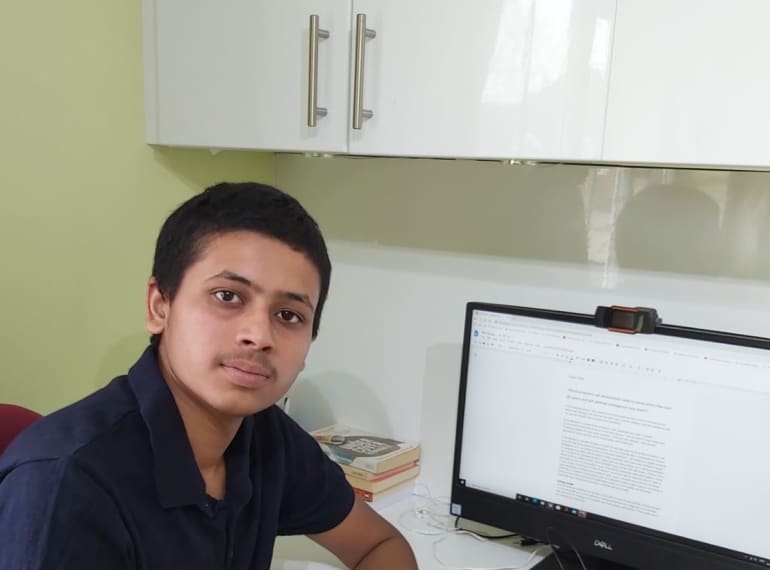
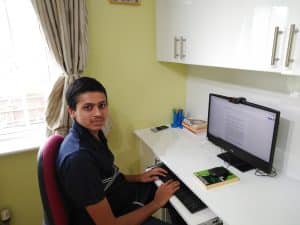 His 1,500-word composition won him the Economics section – and a £1,000 prize – in the annual New College of the Humanities Essay Competition.
His 1,500-word composition won him the Economics section – and a £1,000 prize – in the annual New College of the Humanities Essay Competition.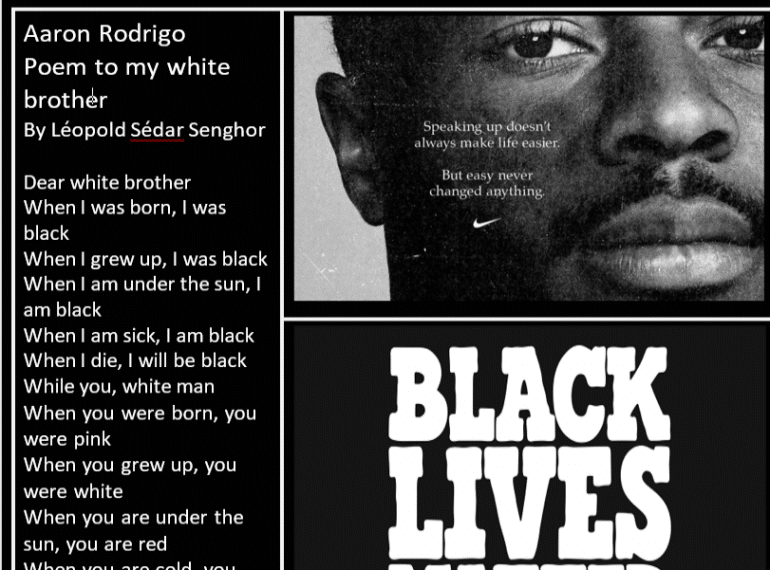
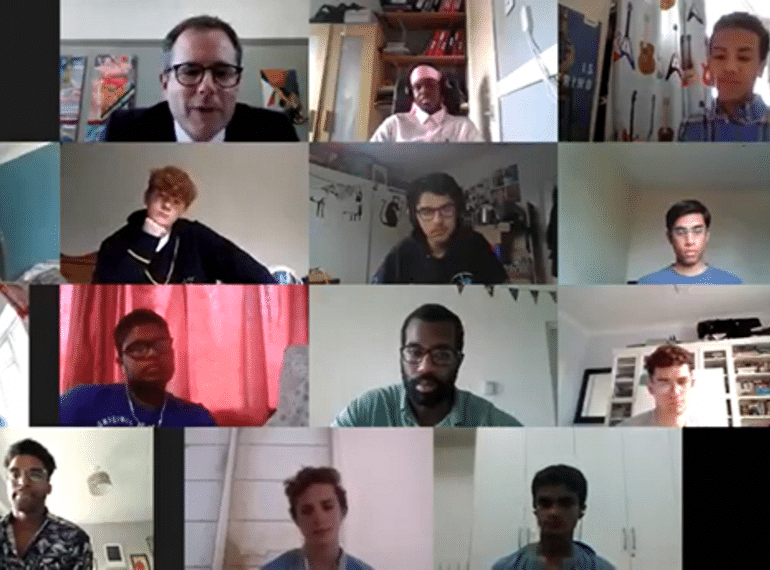
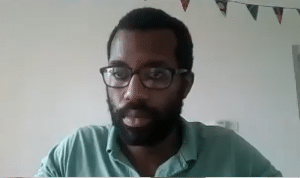 Kelvin (OE 1999–2006) recalled one incident when, as an 11-year-old, he went to a football camp in Totteridge Lane. Another participant made a racist comment to him, but he did not understand it, so asked his mother about it when he got back.
Kelvin (OE 1999–2006) recalled one incident when, as an 11-year-old, he went to a football camp in Totteridge Lane. Another participant made a racist comment to him, but he did not understand it, so asked his mother about it when he got back. Kelvin’s brother, Elliot (2002–2009), a property specialist in London, thanked Thomas and Ayodimeji for chairing the discussion and praised QE for supporting Perspective: “Not every single school and teacher would be willing to use their time to facilitate this sort of thing.”
Kelvin’s brother, Elliot (2002–2009), a property specialist in London, thanked Thomas and Ayodimeji for chairing the discussion and praised QE for supporting Perspective: “Not every single school and teacher would be willing to use their time to facilitate this sort of thing.”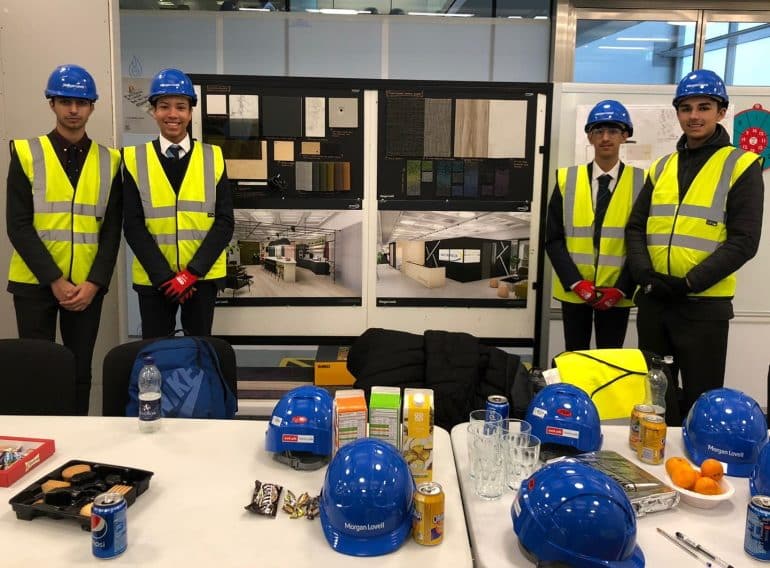
 To address the issue, the boys conducted extensive research over six months. They came up with three designs, all with the same basic idea. The material pushes against the bottom of the blade guard, causing a force that pushes upwards and adjusts the blade guard automatically to the correct and ideal height for cutting. Two of the designs use simple rails and sliders to autonomously adjust the height, while the third uses a rack and pinion. With no user input needed, saw operators can work in the same way as before, but much more safely.
To address the issue, the boys conducted extensive research over six months. They came up with three designs, all with the same basic idea. The material pushes against the bottom of the blade guard, causing a force that pushes upwards and adjusts the blade guard automatically to the correct and ideal height for cutting. Two of the designs use simple rails and sliders to autonomously adjust the height, while the third uses a rack and pinion. With no user input needed, saw operators can work in the same way as before, but much more safely.